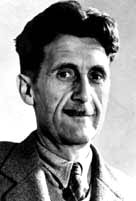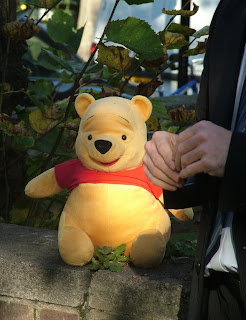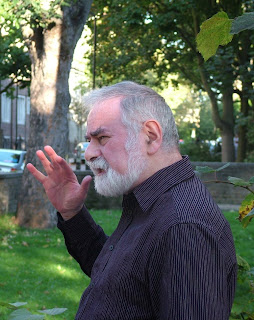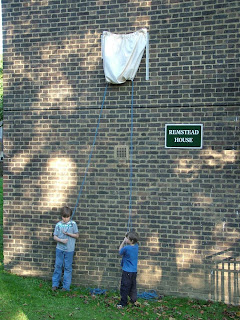The Road to West End Lane
Sadly, I couldn’t make the grand unveiling of the plaque to George Orwell last week, but mercifully (and appropriately), Danny from West End Lane Books could – and kindly penned a few words about it.
“I’ve got something in common with George Orwell it seems! I gleaned this priceless piece of dinner-party ammo the day that Kilburn Historic Plaque supremo Ed Fordham triumphantly brought Richard Blair to town to unveil a tribute to his father, the mighty George Orwell, on the Kilburn estate they briefly inhabited before being bombed out in WW2.
Nowadays, the building is called Kington House in Mortimer Crescent and Blair, not the slight, pale figure I imagined, but a broad avuncular man of old-school bank manager appearance, admitted he didn’t really recall it — unsurprisingly since he was an infant the last time he laid eyes on the place.
A good crowd had gathered to meet the man whose father has so enriched us all and confirmed that Orwell did indeed work on Animal Farm while living in our postcode.
After the unveiling of the plaque Blair and Fordham braved rush hour traffic to hotfoot it over to West End Lane Books where another eager crowd had gathered and was treated to a reading from Orwell’s Bookshop Memories essay — and that’s where I learned of mine and George’s shared experiences!
Bookshops, Orwell remarked of his time working in one, were places ‘you can spend a long time without spending money’. Yep, that bit still rings sadly true. And although our customers aren’t of the ‘motheaten’ variety that Orwell depicts and nor do we regard children’s books as ‘horrible things’ (they obviously didn’t have Puffin, Walker, Usborne et al in those days), his description of the ‘brutal cynicism’ of the marketing of Christmas, in particular the order form for advent calendars displaying ‘two dozen Infant Jesuses with rabbits’ brought a blush of shame.
Orwell went on to describe life with George as his (adopted) father, noting that while he was always Eric Blair to at home, he was only ever George Orwell to his friends and professional contacts (‘the name change was to protect us,’ said Blair.) and often the two camps were not aware of the other; some family members remaining ignorant of George’s alter ego even as his books were published and word began to spread of his work.
Blair recalled his father as an affectionate man who often read to his son—classics such as AA Milne (also honoured by a Kilburn plaque) and Beatrix Potter, but also his own little stories and poetry, none of which survives to our loss. While retaining the then-customary stoicism about his struggles with TB (‘he was slightly vague about it’), Blair told us that his father was nonetheless constrained by his illness and felt that physical contact with his son needed to be minimal for his own safety.
Orwell also read aloud chapters of Animal Farm at home to his wife and Blair reminded us that even this literary colossus had initial trouble finding a publisher. Blair himself was not allowed to read 1984 until some time after his father’s death when he was 11 and when asked when he first became aware of Orwell’s status, he remembered it as a form of osmosis around the same age.
Listening to Blair’s recollections of Orwell doing bits of woodwork, rolling fags with newspapers when he ran out of cigarette papers and all of the everyday trivia family life is filled with, I for one had a few frissons: this man lived with Orwell…this man knew Orwell!
What an honour to have Richard Blair in our shop. What an honour for NW6 to have such a connection! Major thanks to Ed Fordham for making this happen.”









